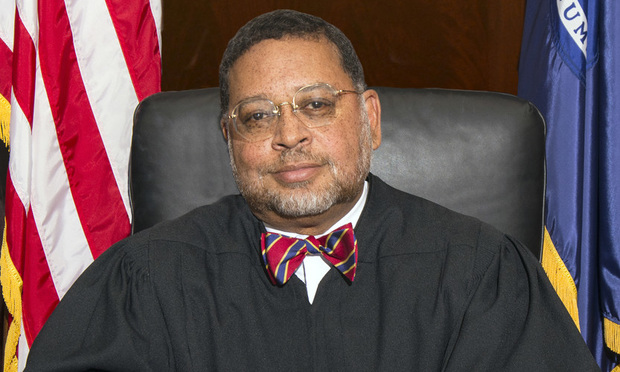Michigan State University GC Ensnared in Ethics Debate Over Outside Counsel Firing
Michigan State University's general counsel and the law firm initially retained to represent seven employees facing a class action lawsuit in the Larry Nassar sex abuse scandal are trading conflict of interest accusations over the GC's firing of the firm. The tangled situation presents a lesson for GCs involved in similar ones.
October 26, 2018 at 04:01 PM
5 minute read
 Robert Young Jr., general counsel with Michigan State University. Courtesy photo.
Robert Young Jr., general counsel with Michigan State University. Courtesy photo.
Robert Young Jr., the new general counsel who steered Michigan State University through the Larry Nassar sexual abuse scandal, is caught up in an ethics controversy after firing Clark Hill, a law firm that was representing a trustee and six MSU employees in suits by Nassar victims.
The ethics controversy, reported this week in the Detroit Free Press, revolves around whether Young fired the Clark Hill law firm because it was representing one employee in a way that made the university and its in-house lawyers look bad.
Young on Friday denied that was the cause of the firing. He told Corporate Counsel that the law firm created a conflict of interest, and that he had no choice but to hire new lawyers to represent the other six defendants and dismiss Clark Hill from their cases.
Clark Hill declined comment on Friday.
The controversy began when the newspaper recently decided to examine why Young, when he was special counsel, fired Clark Hill. The newspaper used the Freedom of Information Act to obtain letters and emails between Young and the law firm last April.
At that time, Nassar, a sports doctor at the school, already had been convicted and sentenced to prison for sexually assaulting hundreds of student athletes over a period of years, claiming that he was simply examining them or giving them “treatments.” A class action lawsuit, brought by the victims and resolved through a $500 million settlement in mid-May, was still pending against the school and the individual employees.
Then, one of the employees, dean of MSU's medical school and Nassar's supervisor, William Strampel, also was charged criminally by the state of Michigan with misconduct. Clark Hill brought in John Dakmak, a criminal defense attorney, to handle that part of Strampel's case.
In a public statement, the defense attorney said that criminal charges against Strampel were unfounded because Strampel was following instructions from MSU's in-house lawyers at the time.
One of those in-house lawyers was assistant general counsel Kristine Moore, who was also named as a defendant in the Nassar victims' class action suit. She was being defended by Clark Hill as well.
The Free Press article implied that Young might have crossed an ethical line by trying to interfere with Clark Hill's duty to its client, Stampel.
The article said Clark Hill partner Reginald Turner emailed Young, reminding him of a rule of professional conduct that says, ”A lawyer shall not accept compensation for representing a client from one other than the client unless … there is no interference with the lawyer's independence of professional judgment or with the client-lawyer relationship.”
According to the newspaper article, Young responded with a letter saying that part of MSU's policy on paying for an outside attorney for employees requires the employee to “cooperate fully on a continuous basis with the university attorney.”
Young's letter went on to say that Clark Hill had the ethical problem—a conflict of interest in representing both Strampel in the criminal case and the other employees in the civil case whom he may accuse of wrongdoing.
Young, a former chief justice of the Michigan Supreme Court, told Corporate Counsel, “They [Clark Hill] created the ethical problem. I am not trying to harm their reputation, but this has been thrust back at us.”
Young said the criminal defense attorney didn't realize that Moore was also a client of the law firm in the civil action “when he asserted that Moore was responsible for failing to supervise Strampel,” because Strampel was supposed to make certain that Nassar complied with protocols imposed on him in 2014.
Young said he offered to speak with a Clark Hill representative about the incident and “how to make it right,” but no one called him. “They got aggressive about it,” Young said, and defended their lawyer. He said, “I didn't hear anything that caused me to believe there wasn't a patent conflict. So I said we need to remove the other individual defendants, and you can represent Strampel.”
Young also said that at the time he, Young, was serving as co-defense counsel with Clark Hill, “and we had an agreement that we weren't disclosing defenses to be asserted among the parties. We would talk to one another about our defenses, but not make it public.” The criminal attorney's statement violated that agreement, Young said.
Strampel was charged with four counts, including a felony, for his role in the Nassar sex abuse case. Young retained Clark Hill to continue to represent Strampel.
MSU continues to pay for half of Strampel's defense costs where the charges involve conduct within the scope of his employment.
David Jaffe, founder and principal of Jaffe Counsel in Birmingham, Michigan, read all the letters and emails obtained by the Detroit Free Press. Jaffe, a former general counsel of the multinational manufacturing firm Guardian Industries Corp., focuses his practice on compliance and governance issues.
Jaffe said it is not clear who is in the right in this situation, because the letter Young wrote to Clark Hill stated that the law firm was not cooperating with the university counsel. Jaffe said, “That was probably not a good idea. It makes it appear the university's concern was its own interests rather than the client's interest,” he said.
“The takeaway from this story for in-house counsel,” Jaffe explained, “is to be careful in how you think through these situations and how you write about them in letters or email.”
This content has been archived. It is available through our partners, LexisNexis® and Bloomberg Law.
To view this content, please continue to their sites.
Not a Lexis Subscriber?
Subscribe Now
Not a Bloomberg Law Subscriber?
Subscribe Now
NOT FOR REPRINT
© 2025 ALM Global, LLC, All Rights Reserved. Request academic re-use from www.copyright.com. All other uses, submit a request to [email protected]. For more information visit Asset & Logo Licensing.
You Might Like
View All
FTC Sues PepsiCo for Alleged Price Break to Big-Box Retailer, Incurs Holyoak's Wrath
5 minute read
Wells Fargo and Bank of America Agree to Pay Combined $60 Million to Settle SEC Probe

‘Extremely Disturbing’: AI Firms Face Class Action by ‘Taskers’ Exposed to Traumatic Content
5 minute read
MLB's Texas Rangers Search for a New GC and a Broadcasting Deal
Trending Stories
- 1Reviewing Judge Merchan's Unconditional Discharge
- 2With New Civil Jury Selection Rule, Litigants Should Carefully Weigh Waiver Risks
- 3Young Lawyers Become Old(er) Lawyers
- 4Caught In the In Between: A Legal Roadmap for the Sandwich Generation
- 5Top 10 Developments, Lessons, and Reminders of 2024
Who Got The Work
J. Brugh Lower of Gibbons has entered an appearance for industrial equipment supplier Devco Corporation in a pending trademark infringement lawsuit. The suit, accusing the defendant of selling knock-off Graco products, was filed Dec. 18 in New Jersey District Court by Rivkin Radler on behalf of Graco Inc. and Graco Minnesota. The case, assigned to U.S. District Judge Zahid N. Quraishi, is 3:24-cv-11294, Graco Inc. et al v. Devco Corporation.
Who Got The Work
Rebecca Maller-Stein and Kent A. Yalowitz of Arnold & Porter Kaye Scholer have entered their appearances for Hanaco Venture Capital and its executives, Lior Prosor and David Frankel, in a pending securities lawsuit. The action, filed on Dec. 24 in New York Southern District Court by Zell, Aron & Co. on behalf of Goldeneye Advisors, accuses the defendants of negligently and fraudulently managing the plaintiff's $1 million investment. The case, assigned to U.S. District Judge Vernon S. Broderick, is 1:24-cv-09918, Goldeneye Advisors, LLC v. Hanaco Venture Capital, Ltd. et al.
Who Got The Work
Attorneys from A&O Shearman has stepped in as defense counsel for Toronto-Dominion Bank and other defendants in a pending securities class action. The suit, filed Dec. 11 in New York Southern District Court by Bleichmar Fonti & Auld, accuses the defendants of concealing the bank's 'pervasive' deficiencies in regards to its compliance with the Bank Secrecy Act and the quality of its anti-money laundering controls. The case, assigned to U.S. District Judge Arun Subramanian, is 1:24-cv-09445, Gonzalez v. The Toronto-Dominion Bank et al.
Who Got The Work
Crown Castle International, a Pennsylvania company providing shared communications infrastructure, has turned to Luke D. Wolf of Gordon Rees Scully Mansukhani to fend off a pending breach-of-contract lawsuit. The court action, filed Nov. 25 in Michigan Eastern District Court by Hooper Hathaway PC on behalf of The Town Residences LLC, accuses Crown Castle of failing to transfer approximately $30,000 in utility payments from T-Mobile in breach of a roof-top lease and assignment agreement. The case, assigned to U.S. District Judge Susan K. Declercq, is 2:24-cv-13131, The Town Residences LLC v. T-Mobile US, Inc. et al.
Who Got The Work
Wilfred P. Coronato and Daniel M. Schwartz of McCarter & English have stepped in as defense counsel to Electrolux Home Products Inc. in a pending product liability lawsuit. The court action, filed Nov. 26 in New York Eastern District Court by Poulos Lopiccolo PC and Nagel Rice LLP on behalf of David Stern, alleges that the defendant's refrigerators’ drawers and shelving repeatedly break and fall apart within months after purchase. The case, assigned to U.S. District Judge Joan M. Azrack, is 2:24-cv-08204, Stern v. Electrolux Home Products, Inc.
Featured Firms
Law Offices of Gary Martin Hays & Associates, P.C.
(470) 294-1674
Law Offices of Mark E. Salomone
(857) 444-6468
Smith & Hassler
(713) 739-1250






